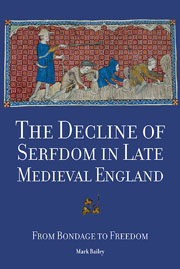Book contents
- Frontmatter
- Contents
- List of Maps
- List of Graphs
- List of Tables
- Acknowledgements
- Abbreviations
- Part I The Decline of Serfdom: Questions and Approaches
- 1 The Decline of Serfdom and its Historical Significance
- 2 The Chronology of Decline: Villein Tenures
- 3 The Chronology of Decline: Servile Incidents
- 4 The Causes of Decline
- Part II Case Studies
- Part III Conclusions
- Appendix: List of original sources used in this study
- Chronology
- Bibliography
- Index
3 - The Chronology of Decline: Servile Incidents
from Part I - The Decline of Serfdom: Questions and Approaches
Published online by Cambridge University Press: 05 March 2014
- Frontmatter
- Contents
- List of Maps
- List of Graphs
- List of Tables
- Acknowledgements
- Abbreviations
- Part I The Decline of Serfdom: Questions and Approaches
- 1 The Decline of Serfdom and its Historical Significance
- 2 The Chronology of Decline: Villein Tenures
- 3 The Chronology of Decline: Servile Incidents
- 4 The Causes of Decline
- Part II Case Studies
- Part III Conclusions
- Appendix: List of original sources used in this study
- Chronology
- Bibliography
- Index
Summary
All sections of medieval English society were liable to render various payments and services to a superior lord, which either marked key moments in the life cycle of an individual or were associated with the terms of their landholding. The nobility and gentry paid aid upon the marriage of their lord's eldest daughter, and were liable for military service; freemen paid relief upon entry to a landholding; and all but the poorest paid mortuary (a death duty) to the church. Villeins and villein tenures were also liable for a range of incidents, dues and services, but these differed from those owed by the rest of society in two ways: they were generally more onerous and demeaning, and the lord could – in strict legal theory – impose them arbitrarily. In reality, by c.1300 the arbitrary imposition of servile dues was exceptionally rare, and instead their frequency and duration were determined and largely fixed by local custom. However, there still remained some elements of uncertainty and unpredictability, in the sense that the precise package of dues, and the way in which they were levied, varied from manor to manor; the lord could determine how much was charged for some dues; and the lord might challenge or ignore custom.
This chapter surveys each of the main dues and incidents associated with villeinage in England in c.1300; briefly explains their character, origin and prevalence; and then constructs as tight a chronology of their decline as the current historical literature permits.
- Type
- Chapter
- Information
- The Decline of Serfdom in Late Medieval EnglandFrom Bondage to Freedom, pp. 37 - 61Publisher: Boydell & BrewerPrint publication year: 2014



